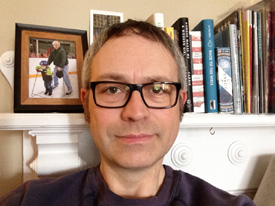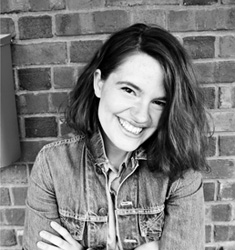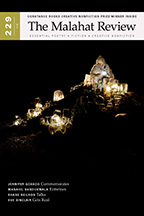On Love, Levity, and the False Brave Face: Michelle Brown in Conversation with Martin James Ainsley
 Poet Michelle Brown
speaks with Martin James Ainsley about fathers and sons, hot cars and humour in "Muscle Car," his poem forthcoming in Issue 194, Spring 2016.
Poet Michelle Brown
speaks with Martin James Ainsley about fathers and sons, hot cars and humour in "Muscle Car," his poem forthcoming in Issue 194, Spring 2016.
I remember that your poems in our UVic undergrad workshop always maintained such a wonderful balance between the rich present and this undercurrent of dread. I see that here, as you masterfully build tension, the "crows circl[ing]". This also leaves the poem somewhat unresolved, giving it a bit of a cliffhanger. Can you speak a bit about the significance of tension to your poetry? And the choice to not have this poem "click shut"?
I’ve always thought of myself as more of a fiction writer than a poet (still do). In general, my favourite poetry has a narrative thrust—many of the confessional poets resonate for me. My most successful poems tend to come from moments in my life that I want to explore, without necessarily going to the next moment, the this-happened-then-that-happened of story. But if you’re not going to tell a linear story, you have to find some other source of tension. With this poem, the reader (and I, as I’m writing) knows what’s going to happen (Dad dies, the car is sold), so the question of what happens next isn’t interesting; the tension is in the unresolvable question posed by the moment in recollection. A resolution would be false, because there is no resolution in life, but it’s a situation and a moment that tells me something—I don’t know what. Resolutions, “closure,” in real life are boring. They make us feel better, but they don’t yield much mystery. My relationship with my father is a mystery I’ll be trying to solve for the rest of my life. I don’t expect to get to the bottom of it, but I do think its contemplation will help me understand him better, and maybe even make me a better father to my own son.
I often have ideas for writing that go nowhere, because I figure them out too easily. I see a resolution, and when that happens, I’m bored by the writing of it. Even a contemplative lyric, an ode on an urn, that sort of thing, you don’t want the poet authoritatively telling you what’s what. When I hear that “click,” I know there is no poem to make.
The car is the only female figure in a story about relationships between men, which I found very interesting. She's a "teenage dream," uniquely able to draw the attention of all three male figures in the poem, but also the one thing that stands between the father and the son. Was feminizing the car a conscious choice? Can you talk a bit about the car's role in the poem?
Yikes. What a question! I don’t think feminizing the car was a completely conscious choice, but I can’t have written that pronoun without at least momentarily thinking about what it might signal for the reader. My first draft was more than three years ago, so I honestly don’t remember. But when I read it now, I know I was playing a bit cheekily with the whole Oedipal thing. That red sports car was sexy, damn it! And as an image it just brought with it a bag full of clichés—mid-life crisis, On the Road fantasies, Jan and Dean surf guitars, girls, girls, girls—that I couldn’t ignore, so I went with it. I even stole that Bruce Springsteen line in the opening stanza (which gave me the iambic rhythm). I sort of had to play that out to get it out of the way and get to the real point.
I think the car really stands for missed opportunity, and actually isn’t gendered in a meaningful way (that’s my story, anyway). Here was something both my dad and I admired and appreciated, and my regret in the poem is that we didn’t make more of it; that rather than showing my interest, my main reaction in the moment was quiet envy over this bright, shiny object that didn’t care if we lived or died. It’s all in that line, “I always wanted to drive her, but he never / offered, and I never asked.” Neither of us could say what he wanted to say. The car could have been a bridge between us, but I treated it as a wall.
You studied writing in both Victoria, BC, and Fredericton, NB. (Both small-ish, university towns!) How did each respective city influence your writing?
In the narrow terms of the university experience, each place offered what I think those levels of education should. My undergraduate program (UVic) was intensive and wide-ranging, showing me all kinds of new experiences, ways of thinking, forms of expression. But it was necessarily restrained and focused on specifics. Small samples of everything and constant deadlines. I had already been in Victoria for fifteen years when I started the BFA, so it was home, comfortable and familiar. I think this made my writing very introspective.
In Fredericton, on the other hand, everything was new and different, so I wrote a lot in the first couple of years about what I found here—the landscape, the history. As a graduate student at UNB, I had much more leeway to explore, both within the confines of the program and outside of it. The graduate program also allowed me to concentrate more on what really interested me, to follow ideas more deeply.
I don’t think there is much specific about each place that I can point to as an influence on my writing—the land and history of the west coast is in my blood, so I keep writing from that place, still. But the break between one place and the other has had a palpable effect. Compounding this sense (to touch on the poem again), my father passed away only a couple months after I moved, so that created a powerful pull back to the west coast in my thinking, even as it emphasized the sense of separation. Almost five years later, the two events—my moving and my father’s death—are weirdly conjoined.
The change has made me more willing to take risks, both in my writing and in other parts of my life. In Fredericton, for example, I started playing music again after a hiatus of nearly twenty years, and every week or two I play bass and guitar and sing in a band with some other writers. Singing in front of other humans was something I’d never really done before moving here. The performative rush of playing in public is something that’s hard to find as a writer, holed up in your study with a computer, but it has inspired me to write simultaneously with more discipline and more freedom. Scales and improvisation.
There's something so playful about describing the speaker's father as "giddy in flip-flops", especially as a counter-point to the machismo of the muscle car. I'm curious about your thoughts on humour and levity in your own writing, especially on balancing it with other, darker elements.
I feel like this question touches on something very fundamental about me as a person, not only in my writing. As an atheist (ex-Catholic), I take the world and my limited time in it very seriously, but I think it’s an error to take ourselves too seriously. The humour and levity—and music and art and love—is what makes living bearable, and that sense is sharpened by the awareness of the dark underneath. The machismo of the muscle car is a pose, a false brave face. At its worst, it’s Trumpism, small-minded and selfish and out to prove something. “Giddy in flip-flops” is the opposite of that; it’s the way we should be in the world, happy in the moment and not caring how we appear to others.
You've packed so many wonderful observations about intergenerational relationships into this poem. I'm struck by the ease that the grandson and grandfather interact, while the son is left to pull the car out of the garage—almost detached from the action. Can you talk a bit about the role family plays in your poem? Do you find these difficult poems to write?
I don’t know if I can say too much more about family in the abstract. Family was intensely (sometimes comedically) important to my father. If it was one of my brothers’ birthdays, for instance, he would phone us to ask whether we’d called the other to wish him a happy birthday. So many phone calls! The interaction between grandfather and grandson in the poem is honest, unburdened by that kind of expectation and guilt. It models a kind of prelapsarian ideal, the way I wanted my own relationship with my father to be. But adult relationships are more complicated than that. I was constantly appalled by my dad’s political views (and he mine)—he always voted Conservative and, in my darkest moments, I fear he may have lived to become a Trump supporter—but he was also capable of great love and joy and generosity. I learned those qualities from him, and they led me in the opposite direction, politically. There’s always that tension with family. How you are as a person comes out of those relationships, but nothing is simple or straightforward. My dad and I were always distant and uneasy with each other, yet somehow still very close. It’s really because of him that I’m so close to my brothers, none of whom are much like me. Love grinds those differences to dust.
Poems like this are difficult for me only insofar as I feel the need to be true to the moment. When you start to write, you don’t know what it is that draws you in, and it can be scary. You have to be open to that fear, knowing you may not like what you find. And it can be difficult not to give in to the temptation of easy resolution and sentimentality, but instead to dwell on the complexity and contingency of the moment, to let the darkness into the poem, as well as the light. The difficulty, though, feels almost technical in a sense. It’s the difficulty of finding the right register, the tone and the honest words that say what needs to be said. Once I know where the poem is going, though, it becomes a pleasure to refine and deepen what’s there. In many ways, I find it more difficult to write a poem without that initial vertigo of emotional fear. I admire true lyric poetry, where the poet meditates on some small object or phenomenon—like Don McKay writing about a bird or a rock formation—or ekphrastic poetry. I’d love to be able to do that, but I lack the patience.
I've got to ask—what's your 'muscle car', your big retirement purchase, your just-won-a-massive-literary-prize splurge?
Oh, I generally covet small-potato stuff: a new guitar, a microphone, or a mandolin. The best car I ever owned was a 1988 BMW 325i. (It was probably parked in my dad’s driveway while we examined his Chevy.) The transmission burned out not long after our daughter was born, so with two kids in car seats, we decided to trade its remains in on a more “practical” car. Given the chance, I’d buy another one in a heartbeat. Like father, like son, I guess.

Michelle Brown
* * * * * * * *









